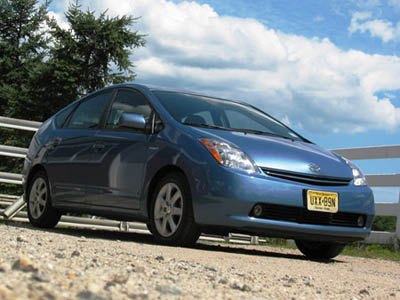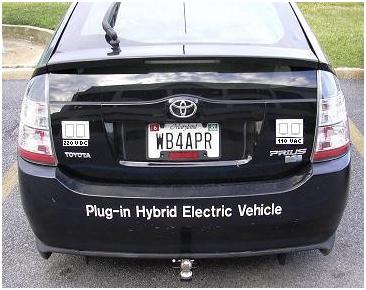

So late last night, I get an email from the Big Boss Man, Chris, about the batteries on the Toyota Prius. The conversation goes something like this:
Chris:
“Want to do a factual/opinion piece on this? It’s a question I’ve heard quite a few times.”
Tony:
“You mean changing out the Prius battery question is one you’ve been hearing?”
Chris:
“More like what happens when the batteries stop recharging. Seems like people think they’ll run out within a few years.”
Tony:
“Ah, sure … really? People think that? Damn … ”
Allow me to put your mind at ease … right after the jump.
This whole issue was prompted by a blog post on Toyota’s Open Road Blog. It seems that some people think that the battery pack on a Prius, or any other hybrid for that matter, has a short shelf life. They don’t, but like everything else in the known universe, they DO have a given lifespan.
Normally, batteries are fairly simple devices, especially the simple lead/acid ones, like the kind in your flashlight and Prius. Sure, they will eventually wear out, but the key to maintaining a long life for most simple batteries is to make sure they’re fully charged when you idle them. With the battery in your car, or the batteries in a Prius, this isn’t a problem, because the cars alternator & charging system makes sure the battery is fully charged up when you park the car for the night.
What kills a lead/acid battery is letting it rest when it’s partially charged, or, more normally, letting it sit. That’s why, when you find that Ferrari GTO in the barn for $500, it won’t turn over. The battery has gone flat. You get out the jumper cables, and of course the car will fire up and run, cause it’s firing from the alternator at that point.
If you shut the car off, it won’t start again. Why? The battery won’t hold a charge.
Even with a car as exotic as a GTO, the answer is simple: You go down to the nearest Shucks/Kragen/auto parts store and get the right kind of 12 volt battery, swap it out with the old one like you would a light bulb, and your on your way.
Of course, this procedure is not the same for Toyota’s Prius.
There’s a BUNCH of batteries in there, and they’re largely inaccessible to mere mortals (you better have a lift for the car etc etc etc). The good news is that the batteries are a really robust part of the whole system, and, as you would expect, Toyota has been keeping track of all the Prius out there to see how they’re doing int he real world.
There’s more than a few 1st gen Prius that are in the quarter million mile club, that are still running like trains, and there’s even a Gen 1 Prius taxi in Victoria B.C. that’s over 300,000 with no battery related problems. And just in case you’re interested, the record is over 400,000 miles for a Prius.
So really, the batteries in a hybrid are a pretty strong link in the chain. The stuff that will wear out is the stuff that has always worn out, things like head gaskets and transaxels and tires and brakes and whatnot.
Don’t worry about the batteries.
Here’s the full scoop from Toyota’s Jon F. Thompson.
You probably know that we’ve been selling our Prius hybrid here in the U.S. since 2001. So let’s do the mileage math: At an average of 15,000 miles per year for seven years, that suggests that these 2001 Priuses could have a bit more than 100,000 miles on them. Some of them probably have many fewer miles. But some of them undoubtedly have seen many more miles scroll past their odometers.
Which of course raises a question in which owners of these cars are deeply interested: What happens when the battery packs that are fundamental elements of the Prius package no longer can store electrical power?
Make no mistake, batteries do, in non-technical terms, wear out. What happens is that they no longer can maintain the electrical charge that is essential to their ability to supply electrical power. But having changed countless batteries in flashlights and other devices, you already know that, right?
It is a fact that some of our first-generation Priuses are still going strong with more than 200,000 miles on their original batteries. A couple of cars doing taxi service in Victoria, British Columbia reportedly have seen 300,000 miles and in one case, 400,000 miles on the original batteries with what’s described as “very few maintenance issues.”
This is not to suggest, mind you, that anyone else will see these kinds of miles on their Prius batteries. It is only to suggest that fears of premature battery failure probably are unwarranted.
That said, there will come a time when replacement of the car’s batteries will be required. So you should know that first of all, Prius batteries are warranted for 10 years or150,000 miles in California-compliance states and eight years or 100,000 miles in non-California compliant states.
And you also should know that the battery packs are available from any Toyota dealer. The MSRP for a battery pack for a first-generation Prius is $2,299, while the MSRP for the battery pack for the second-generation cars, those from the 2004-2008 model-years, is $2,588. This reflects three price reductions for the first-generation battery since it was introduced and two price reductions for the second-generation battery. Naturally, labor charges, which are set by each dealer, as well as possible charges from ancillary parts that could be required, should be added to that figure. Finally, we assume responsibility for recycling all of our hybrid batteries.
So on one hand, battery replacement in a Prius is neither as simple nor as inexpensive as replacing the battery in a conventional car. But on the other, once the job is done, a replacement battery pack should be capable of delivering many more miles of the clean, efficient transportation owners have come to expect from their Priuses.
- Jon F. Thompson, Editor, Open Road Blog
0 comments:
Post a Comment